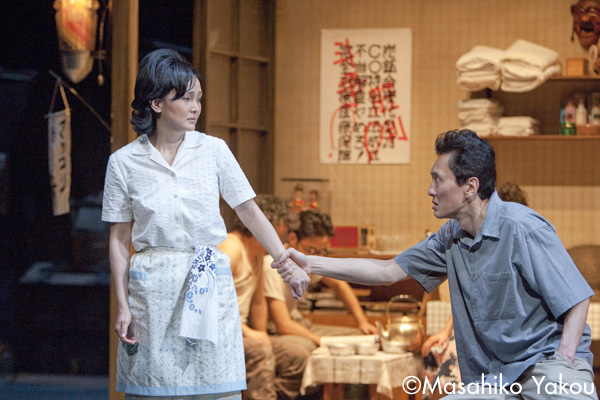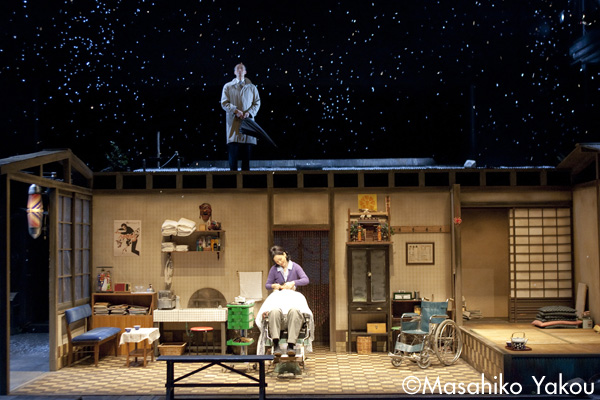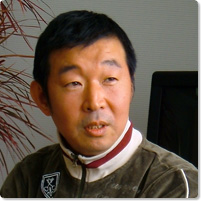In a block of shacks where coalminers live on “Ariran Pass” overlooking the Ariake Sea on the coast of the island of Kyushu, stands a small hairdresser shop named “Tamayama Public Health Hairdressing Salon” run by a woman named Sumi. Her family are ethnic Korean residents of Japan, including her father Hongil and her husband Sonfun. In the neighborhood lives her older sister Hatsumi, who is now the common law wife of Ohmura, the union leader at the local coal mining company, Hatsumi’s middle school-aged son Daikichi by her former husband, her newlywed younger sister Harumi and her husband Shohei and Sonfun’s younger brother Yonfun. The story is narrated by Daikichi in his adult persona of Daidaikichi (Big Daikichi).
The year is 1965 and it is the day of the local summer festival. Sumi’s beauty parlor is bustling with confusion as people hurriedly make preparations for the festival. For Sonfun and the other members of the 1st Labor Union that Ohmura is chairman, the labor environment is deteriorating as they continue to get cold treatment from the mining company’s management. The disheartened Sonfun now quarrels constantly with his wife Sumi, whose dream was to move to another town and open a beauty salon with the name Sumire (violets), after her own name.
The scream of a siren signals an accident has occurred in the mine. Worried about Shohei and others now on shift in the mine, Sonfun heads off to help in the rescue operation.
A few days later. The block is buzzing with activity as the funeral services are carried out for the victims of the accident. Harumi shows up wearing some bruises and her husband Shohei follows with an apologetic look. Suffering from the aftereffects of carbon monoxide poisoning from the mine accident, Shohei had gone berserk and injured Harumi. Yonfun, who was crippled in one leg by an earlier cave-in accident at the mine, says he is giving up on life in this town and answering the call from the North Korean government for ethnic Koreans to return and help build the country. Yonfun has secret feelings for his sister-in-law Sumi and invites her to come with him to North Korea. Then, suffering from the same carbon monoxide poisoning aftereffects, Sonfun suffers an attack of spasms and goes wild.
Autumn. Both Sonfun and Shohei are suffering so seriously from the accident’s aftereffects that they can barely get along with their daily lives. Yonfun continues his preparations to go to North Korea and again asks Sumi to come with him, but she turns him down unequivocally.
Summer, two years later. Sumi has joined the fight to get compensation from the company for the victims of the mine accident. Harumi and the families of the other victims are nearing their wits end with no help in sight.
In the midst of this, the date of Yonfun’s departure has been decided. In a fit of anger over Sumi’s concern for his younger brother, Sonfun tries to vent his frustration through sexual assaults on her, but the aftereffects of the carbon monoxide poisoning have left him impotent. He tells Sumi that, in the state he is in, she should leave him and find someone else. Just then Ohmura rushes in with the news that a law has been passed to provide care for victims of carbon monoxide poisoning, but it has turned out to be a very unfair law.
The next autumn. It is the day of Yonfun’s departure for North Korea. His brother Sonfun shows up drunk among the people come to see Yonfun off. Sonfun confronts his brother telling him that he will give him Sumi if he will just quit this idea of going to North Korea. A violent fight breaks out between the two. Sumi intervenes to try to stop the fight, but Yonfun throws her aside and runs off. Left alone now, Sonfun tries to commit suicide but Hongil stops him and he breaks down crying.
A year later on New Year’s Eve. Hatsumi and the other women are making the customary rice cakes. Sumi announces that she is going to sue the mining company. Ohmura arrives late and says that the company has made a proposal to shut down the mine.
Just then Harumi comes in saying that she has given into the pleading of the suffering Shohei and put him out of his misery as he wanted. The father Hongil tells her to go to the police, and to remember that we must keep on living no matter how hard things get. With her head hung low, Harumi leaves.
Spring has come. Sonfun is helping Ohmura with his preparations to move. The family is moving to Osaka and taking the father Hongil with them. The other coal miners have also moved away, leaving Sonfun and Sumi behind.
Daikichi, now grown into the adult Daidaikichi narrates the thing that happened to everyone after that. In the pouring snow, still talking about her dream of opening a beauty salon, Sumi calmly shaves Sonfun. For this couple that has transcended all their sorrows and anger and decided to live on in this place, Daidaikichi standing on the roof holds an umbrella over their heads.




